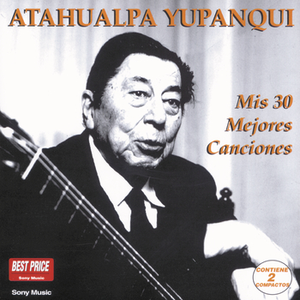Yupanqui was born Héctor Roberto Chavero Haram in Pergamino (Buenos Aires Province), in the Argentine pampas, about 200 kilometers away from Buenos Aires. His family moved to Tucumán when he was ten. In a bow to two legendary Incan kings, he adopted the stage name Atahualpa Yupanqui, which became famous the world over.
In his early years, Yupanqui travelled extensively through the northwest of Argentina and the Altiplano studying the indigenous culture. He also became radicalized and joined the Communist Party of Argentina. In 1931, he took part in the failed uprising of the Kennedy brothers and was forced to seek refuge in Uruguay. He returned to Argentina in 1934.
In 1935, Yupanqui paid his first visit to Buenos Aires; his compositions were growing in popularity, and he was invited to perform on the radio. Shortly thereafter, he made the acquaintance of pianist Antonieta Paula Pepin Fitzpatrick, nicknamed "Nenette", who became his lifelong companion and musical collaborator under the pseudonym "Pablo Del Cerro".
Because of his Communist Party affiliation (which lasted until 1952), his work suffered from censorship during Juan Perón's presidency; he was detained and incarcerated several times. He left for Europe in 1949. Édith Piaf invited him to perform in Paris in June of that year. He subsequently toured extensively throughout Europe.
In 1952, Yupanqui returned to Buenos Aires. He broke with the Communist Party, which made it easier for him to book radio performances.
Recognition of Yupanqui's ethnographic work became widespread during the 1960s, and nueva canción artists such as Mercedes Sosa recorded his compositions and made him popular among the younger musicians, who referred to him as Don Ata.
Yupanqui alternated between houses in Buenos Aires and Cerro Colorado, Córdoba province. During 1963-1964, he toured Colombia, Japan, Morocco, Egypt, Israel, and Italy. In 1967, he toured Spain, and settled in Paris. He returned regularly to Argentina, but these visits became less frequent when the military dictatorship of Jorge Videla came to power in 1976.
Yupanqui died in Nimes, France in 1992 at the age of 84; he was buried in the Cerro Colorado Cementery.
La huanchaqueña
Atahualpa Yupanqui Lyrics
Jump to: Overall Meaning ↴ Line by Line Meaning ↴
De buena gana,
Para ver si me quieren
Las huanchaqueñas.
Amarillo es el oro,
Blanca la plata,
Y negros son los ojos
Rancho de Cerro Pilcao
Cuando volveré
A vivir en el pago
Donde me crié
¡Ay, ay, ay, ay!
La huanchaqueña.
Al pasar por Huanchaca,
Me corte un dedo.
Salió una huanchaqueña,
Me ató un pañuelo.
Dicen que no son tristes
Las despedidas.
Decile al que te lo dijo
Que se despida.
Rancho de Cerro Pilcao
Cuando volveré
A vivir en el pago
Donde me crié
¡Ay, ay, ay, ay!
Mi huanchaqueña.
The lyrics of Atahualpa Yupanqui's song "La Huanchaqueña" speak of the singer's desire to go to Huanchaca, a town in the province of Salta, Argentina. He wants to see if he will be loved by the women of the town, called "huanchaqueñas." The first two lines express his willingness to go to Huanchaca. He goes on to describe the colors of gold and silver, and the black eyes of the women that captivate him. This is followed by a verse that portrays his nostalgia for his homeland, the ranch of Cerro Pilcao, and his wish to return there. The chorus, "Ay, ay, ay, ay! La huanchaqueña," is a lament for the Huanchaqueña, the woman who he cannot have.
The second stanza begins with a description of the singer's injury as he passes by Huanchaca, and the appearance of a woman from the town who helps him. He then refutes the notion that goodbyes are not sad, telling the person who said this to say goodbye themselves. The song ends with a repetition of the chorus, with the singer mourning the unreachable Huanchaqueña.
Line by Line Meaning
Para Huanchaca me juera
I would happily leave for Huanchaca, to see if the Huanchaqueñas will love me.
De buena gana,
Willingly,
Para ver si me quieren
To see if they love me.
Amarillo es el oro,
The gold is yellow,
Blanca la plata,
The silver is white,
Y negros son los ojos
And the eyes that kill me are black.
Que a mi me matan.
That cause my death.
Rancho de Cerro Pilcao
House in Cerro Pilcao,
Cuando volveré
When will I return
A vivir en el pago
To live again in my childhood home.
Donde me crié
Where I was raised.
¡Ay, ay, ay, ay!
An expression of pain or emotion.
La huanchaqueña.
The Huanchaqueña woman.
Al pasar por Huanchaca,
As I passed through Huanchaca,
Me corte un dedo.
I cut my finger.
Salió una huanchaqueña,
A Huanchaqueña woman appeared.
Me ató un pañuelo.
She tied a handkerchief around my finger.
Dicen que no son tristes
They say that goodbyes are not sad.
Las despedidas.
The goodbyes.
Decile al que te lo dijo
Tell the person who said that to you,
Que se despida.
To say their goodbyes.
Mi huanchaqueña.
My Huanchaqueña woman.
Contributed by Adeline L. Suggest a correction in the comments below.

@marcelyanez9045
Mi eterno agradecimiento, don Atahualpa, por su integridad humana y artistica.
@renshimarek
Super !